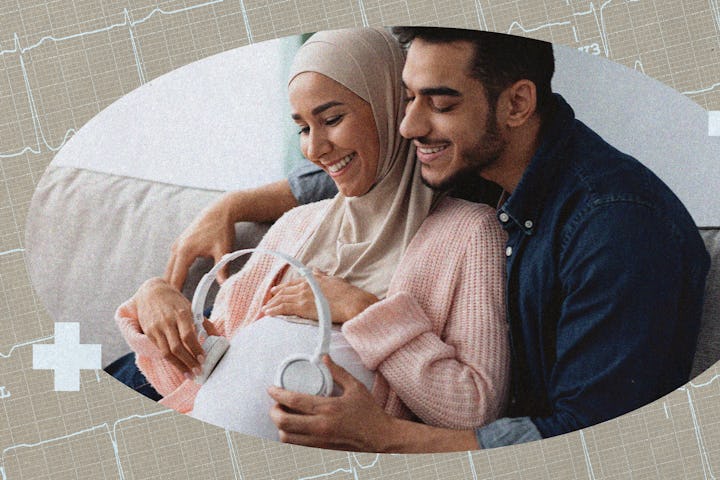Nursery Rhymes Help Babies Learn Language — Even In The Womb
It’s all about the rhythm of your speech.

Babies start hearing in the womb potentially as early as 14 weeks. As pregnancy progresses, the range of frequencies a fetus can hear continues to increase. All of this means that your child really does hear you when you talk to your baby bump — and the research team behind a new study says doing so, especially in a sing-song way, can help your baby learn language.
Traditionally, it was thought that babies learn language by listening to and eventually putting together the smallest phonetic elements that make up speech, like ‘s,’ ‘a,’ and ‘ch.’ The thought was that babies learned how to string these small sound elements together to make words, typically starting around 11 months.
But a new study, published in the journal Nature Communications, finds that babies learn to process phonetic information too late and slowly for babies to first learn language based on these tiny sound elements. There must be some other type of language learning element at play — and the study authors think it all has to do with rhythm.
For the study, the researchers used EEGs to measure the brain activity of babies at 4 months, 7 months, and 11 months of age as they watched a video of a teacher singing 18 nursery rhymes. They ran that brain activity through an algorithm to determine when the babies were able to tell apart different phonetic features, like ‘sh’ versus ‘ch.’
They found that babies are able to start differentiating between phonetic features at 7 months. However, even before that age, most babies are able to recognize words they hear often, like “dada” or “bottle.” This suggests that before 7 months, babies must be able to recognize familiar words not based on their phonetics but on something else.
Another conundrum: The researchers found that babies start speaking words around 11 months, but they’re still not great at encoding phonetic information by that time. “From [7 months], individual speech sounds are still added in very slowly — too slowly to form the basis of language,” Usha Goswami, a neuroscientist at University of Cambridge and an author on the study, said in a press release.
Parents should talk and sing to their babies as much as possible or use infant-directed speech like nursery rhymes — because it will make a difference to language outcome.
So how do babies begin to learn language if not through phonetics?
The researchers think that babies begin learning language in their first few months of life, and potentially even in the womb, by processing rhythmic information, like sing-song speech or nursery rhymes.
With rhythmic speech, there’s a rising and falling of tones and emphasis on different syllables. Rhythmic speech helps babies learn the boundaries of individual words at a young age, so the research team recommends parents start using it around their babies as soon as they can.
The theory that rhythmic speech drives early language learning is backed by a 2021 study that found that even newborns can detect some amount of rhythm in speech. And a recently published sister study to the new study found that differences in how babies as young as 2 months process rhythmic speech information is linked to their subsequent language development abilities.
As such, Goswani postulated that differences in rhythmic encoding as a baby may be the reason some kids have problems with language, such as dyslexia, years down the line.
“We believe that speech rhythm information is the hidden glue underpinning the development of a well-functioning language system,” Goswami said. “Infants can use rhythmic information like a scaffold or skeleton to add phonetic information onto.”
“Parents should talk and sing to their babies as much as possible or use infant-directed speech like nursery rhymes — because it will make a difference to language outcome,” she added. “We’re biologically programmed to emphasize [rhythm] when speaking to babies.”